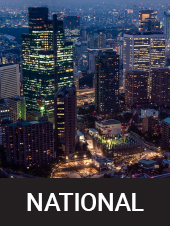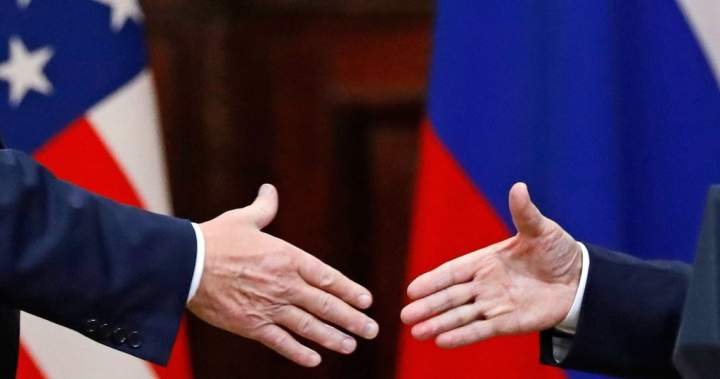U.S. President Donald Trump’s pivotal meeting Friday with Russian President Vladimir Putin is being watched with cautious optimism by Ukrainian Canadians, who are hopeful that Ukraine’s interests and rights will be upheld in the push to end the war.
Canada is home to the second-largest Ukrainian diaspora in the world, which grew larger after the country accepted Ukrainians fleeing Russia’s full-scale invasion.
While they distrust Putin’s willingness to negotiate a ceasefire or give up his territorial ambitions, community leaders say they appreciate Canada’s role in ensuring Ukraine has a seat at the table.
“We’re watching this with curiosity,” said Ihor Michalchyshyn, CEO and executive director of the Ukrainian Canadian Congress.
“I think we’re going to find out, is President Trump there to be an ally of Russia or an ally of Ukraine, or some third option?”
Trump has lowered expectations for what could emerge from the summit, saying Thursday he wants to “set the table” for a second meeting between himself, Putin and Ukrainian President Volodymyr Zelenskyy.
Those comments came after European leaders, along with Prime Minister Mark Carney, stood united in voicing “shared principles, including that decisions on the future of Ukraine must be made by Ukrainians” in a virtual meeting Wednesday that included Zelenskyy and U.S. Vice-President JD Vance.
Trump briefed Zelenskyy, Carney and European leaders on the upcoming summit with Putin in a call on Wednesday, and has promised to brief them again following the meeting.
“We feel that with Europe, with Canada, with Ukraine kind of speaking with one voice to the American president, he is listening,” Michalchyshyn said.
“We hope that this will be what he takes into the meeting with the Russians, but you never know … what Putin will do in a room with Trump.”
Canada has been one of the most vocal defenders of Ukraine since Russia first invaded and annexed Crimea in 2014, and particularly after Russia’s full-scale invasion began in February 2022.
That support has continued since Carney became prime minister earlier this year.

Get daily National news
Get the day’s top news, political, economic, and current affairs headlines, delivered to your inbox once a day.
He hosted Zelenskyy at this summer’s G7 summit in Alberta, where Carney announced a new military aid package worth over $2 billion — pulled from previously-announced funding — as well as the first tranche of money backed by frozen Russian assets that will go toward rebuilding Ukraine following the war.
Carney affirmed in calls with Zelenskyy and British Prime Minister Keir Starmer this week that Canada welcomes Trump’s leadership in seeking an end to the war, but that Ukraine’s sovereignty and territorial integrity must be protected.
Support for Ukraine has also come from Canadians themselves through humanitarian aid donations.
The Canada-Ukraine Foundation, which focuses on getting that aid delivered to Ukraine and other humanitarian efforts, says it has sent over $95 million to the country since 2022.
Valeriy Kostyuk, the group’s executive director, said there have been noticeable upticks in support and donations so far this year — particularly after Trump and Zelenskyy’s disastrous meeting in the Oval Office in February, but also following Trump’s threats to make Canada the 51st U.S. state.
“It’s a parallel,” he told Global News of the threats to Canada’s sovereignty.
“I think that experience allowed Canadians to relate a little bit more to the issues that started in 2014 (for Ukraine).”
Kostyuk said the CUF and other Canadian charities have helped fill some of the humanitarian funding gaps in Ukraine left by the dismantling of the U.S. Agency for International Development (USAID) earlier this year.
The CUF’s latest mission has been to try reuniting Ukrainian children forcibly removed by Russian forces with their families — an issue the Canadian government has been co-leading international efforts to resolve.
Over 19,000 Ukrainian children have been relocated to Russia, with many adopted by Russian families or held in “summer camps.”
Researchers and advocates say the goal is to erase the children’s Ukrainian identity and prepare them for military conscription when they become adults.
Former prime minister Justin Trudeau last year accused Russia of committing an “element of genocide.”
That Russian effort is symbolic of the need to stand up forcibly against Putin in negotiations, Kostyuk said.
Russia currently controls around a fifth of Ukraine’s territory, and Zelenskyy and the Europeans worry that a deal set by Trump and Putin could cement those gains.
Trump has acknowledged the possibility of “land-swapping” under a future deal, but has also promised to get some territory back for Ukraine.
Michalchyshyn said the focus for himself and the Ukrainian community is to ensure the prospect of giving up occupied territory doesn’t become a reality.
“Holding firm to the fact that Ukraine’s territorial integrity and decision-making processes are its own, and not being ceded to someone else or negotiated away — that there are key lines to hold to — that’s what we’re seeing is the most essential role of European and Canadian leadership at this point,” he said.
Zelenskyy has criticized any talk of Ukraine ceding any territory to Russia, noting Ukraine’s territorial borders are enshrined in its constitution and would require a referendum to alter.
Trump said Monday he’s “a little bit bothered” by that.
Kostyuk said there are historical parallels to what could emerge out of Friday’s U.S.-Russia summit.
“Quite often we compare the crossroad at which Trump currently is to Chamberlain’s approach of appeasing and dealing with Hitler,” he said, referring to the 1938 Munich Agreement that ceded the Sudetenland from Czechoslovakia to Germany.
Historians have criticized that deal for setting the stage for Hitler’s further incursions into Europe, and ultimately the Second World War.
“The sentiment from within the (Ukrainian Canadian) community has been consistent: that appeasement of the aggressor at the cost of the victim, which is Ukraine, is not going to bring a sustainable and just peace,” said Kostyuk.
“Supporting justice has been something that the community has been calling for.”
Read the full article here


